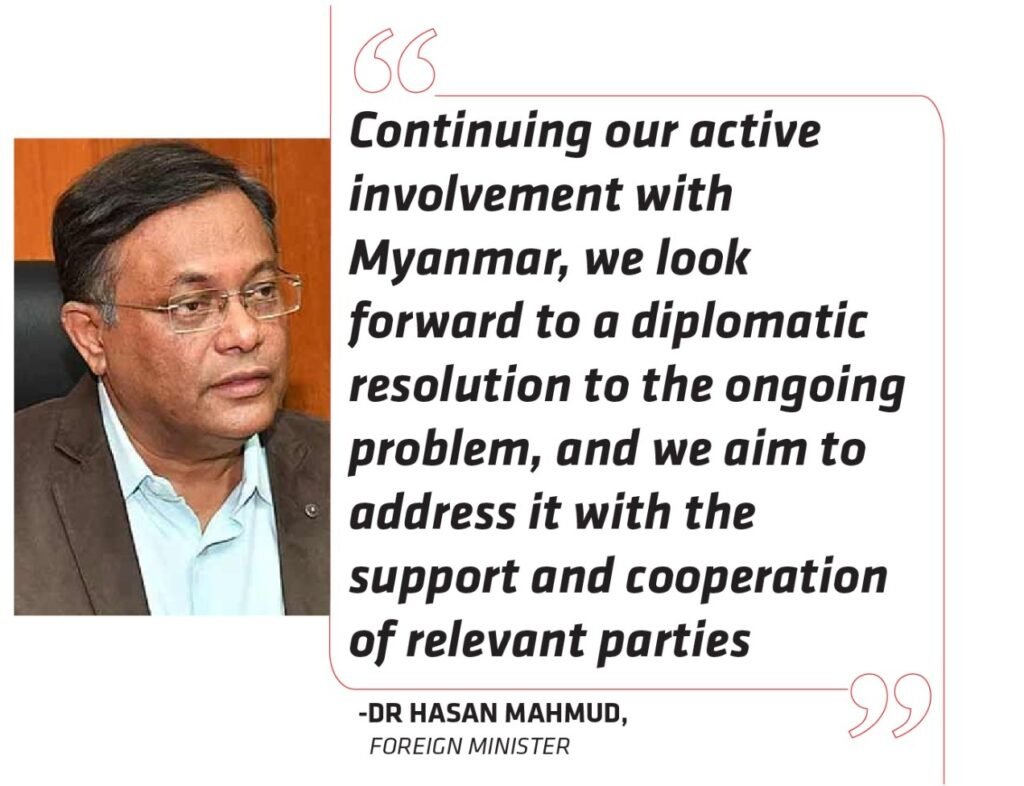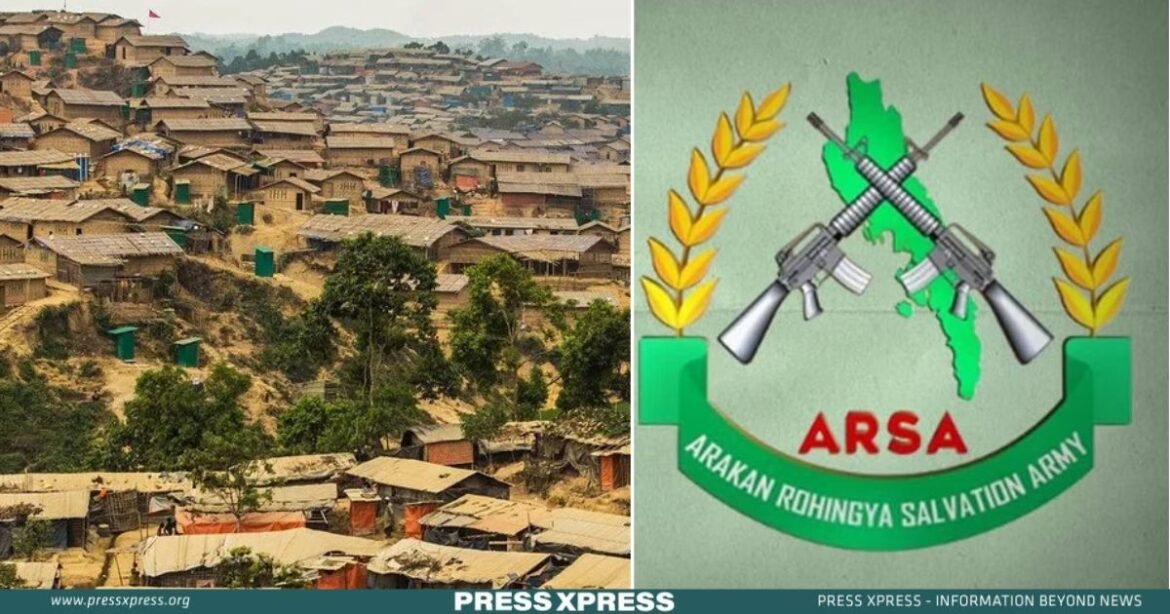Key highlights:
- ARSA members, numbering between 10 and 12, sought out Rahim Ullah (35) at his residence within camp no. 20, eventually fatally stabbing him.
- The registered number of Rohingya refugees reached 965,467 as of September 2023.
- The prolonged provision of shelter to over 1.2 million Rohingyas has stretched Bangladesh to its limits, incurring significant socio-economic, demographic, and environmental consequences.
In the heart of South Asia, a tragic saga unfolds as the Rohingya crisis continues to cast its ominous shadow over Bangladesh. Against the backdrop of picturesque landscapes, a harrowing tale of persecution and violence grips the nation. The Rohingya, a Muslim minority group, have become the focal point of an international humanitarian crisis, facing relentless persecution and killings. The registered number of Rohingya refugees reached 965,467 as of September 2023.
You can also read: Need to Curb Essential Commodities Price
As the world watches in horror, Bangladesh grapples with the immense challenges posed by the unfolding tragedy, navigating a complex web of political, social, and humanitarian issues. The ongoing plight of the Rohingya stresses the urgent need for global attention and collaborative efforts to address the deep-seated issues fueling this humanitarian catastrophe.
On January 13, 2024, a Rohingya man, was fatally stabbed inside a Ukhiya refugee camp in Cox’s Bazar, allegedly by members of the Arakan Rohingya Salvation Army (ARSA) one of the active gangs among 10 others, according to Shamim Hossain, the officer-in-charge (OC) of Ukhiya Police Station.
Within a span of 24 hours, another Rohingya man lost his life in another Ukhiya refugee camp in Cox’s Bazar, under similar circumstances, as he was allegedly killed by the same ARSA gang, echoing the earlier incident.
ARSA’s Chilling Attacks Leave Trail of Deaths in Ukhiya
“ARSA members, numbering between 10 and 12, sought out Rahim Ullah (35), community leader of Block M 27 at his residence within camp no. 20, eventually fatally stabbing him,” revealed OC Shamim Hossain. Subsequently, Rahim’s lifeless body was discovered and transported to Cox’s Bazar General Hospital for a thorough autopsy, as stated by the police official.
Emphasizing Rahim’s criminal background, Hossain added that he was wanted in multiple cases, including an assault on the police, and had been evading arrest. The OC confirmed an ongoing operation to apprehend the assailants responsible for Rahim’s murder.
According to local accounts, Rahim had severed ties with ARSA approximately five months prior and had been in hiding. Members of ARSA had repeatedly visited his residence in their attempts to locate him.
Expert Opinion

Assistant Professor
Department of Criminology & Police Science University of Chittagong.
In light of the similarities between Rahim and Hujit’s cases, are there any connections or patterns that suggest a larger strategy behind ARSA’s actions in the region?
The incident of two deaths in the Rohingya camp is not an isolated event. Recently, conflicts have erupted between the ARSA group within the Rohingya camp, spreading news of clashes to various places. Notably, some foreign NGOs have been reported to assist terrorist groups, raising concerns. In the political context of Bangladesh, terrorist attacks occur amidst political polarization. There is evidence that conspirators against Bangladesh are using the Rohingya camps to make the situation unstable, orchestrating incidents of violence as part of their strategy.
On the same day, around 4:30 pm, another tragic incident unfolded in Block C6 of Camp-19, where 35-year-old Hujit Ullah met a brutal end at Jamal Bazar Chaumohoni. OC Md Shamim Hossain recounted that Kari Jobi Ullah and Abdus Sharif, both Rohingyas, lured the victim to Jamal Bazar, where they were joined by around 10-12 ARSA members.
The assailants resorted to firing several rounds of bullets to disperse onlookers before ruthlessly hacking Hujit to death. Similar to Rahim’s case, the lifeless body was later recovered and sent for autopsy at Cox’s Bazar General Hospital.

Foreign Minister Warns of Regional Consequences Without Timely Rohingya Repatriation

Speaking at the Ministry of Foreign Affairs on January 14, newly appointed Foreign Minister Dr. Hasan Mahmud expressed his optimism that diplomatic channels could bring about a resolution to the Rohingya crisis. He stressed the government’s commitment to avoiding conflict in resolving issues and shared insights from his personal visits to the camps, both before and after the recent influx of Rohingyas.
The Ministry of Foreign Affairs expressed the government’s intent to initiate the repatriation of Rohingyas to Myanmar, starting with approximately 1,000 refugees. Myanmar has been provided with a list of over 3,000 Rohingyas by Bangladesh as part of their efforts to facilitate the repatriation process.
The government of Bangladesh has raised concerns about the significant reduction in humanitarian aid for the Rohingya population, particularly given the continuous growth of around 30,000 newborns annually in the camps, exacerbating the existing crisis.
Procrastination in initiating a secure, voluntary, and enduring repatriation process, coupled with a lack of humanitarian aid, could jeopardize the entire region. The prolonged provision of shelter to over 1.2 million Rohingyas has stretched Bangladesh to its limits, incurring significant socio-economic, demographic, and environmental consequences.
It has been established by the foreign ministry that those forcibly displaced individuals harbor aspirations and entitlements to return to their home country safely and sustainably.

The Rohingya crisis is not just a national concern; it is a global call for compassion, cooperation, and a resolute commitment to human rights. The world cannot afford to turn a blind eye to the suffering of the Rohingya people. It is time for nations to unite, advocate for justice, and work towards a future where the Rohingya can rebuild their lives with dignity and security.


